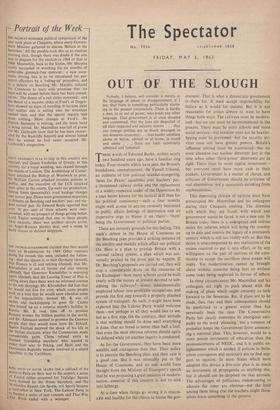OUT OF THE SLOUGH
Nobody, I believe, wilt consider it merely as the language of spleen or disappointment, if I say, that there is something particularly alarm- ing in the present conjuncture. There is hardly a man, in or out of power, who holds any other language. That government is at once dreaded and contemned; that the laws are despoiled of all their respected and salutary terrors . . . that our foreign politics are as much deranged as our domestic economy; ... that hardly anything above or below, abroad or at home, is sound and entire . . these are facts universally admitted and lamented.
THESE words of Edmund Burke, written nearly two hundred years ago, have a familiar ring today. Four months which have seen the Brussels breakdown, unemployment, the' Vassall tribunal, an outburst of low political scandal-mongering, `Spies for Peace,' squabbles over teachers' pay, a threatened railway strike, and the replacement of a widely respected leader of the Opposition by a man better known for his tactical skill than for his political consistency—such a four months might well arouse in anyone remotely interested in public affairs feelings of depression and an imperative urge to blame it on `them'—`them' being the Government or political parties.
There are certainly grounds for this feeling. This week's debate in the House of Commons on the Beeching plan provides a striking instance of the sterility and muddle which.afflict our political life. Here is a plan to provide Britain with a rational railway system, a plan which was uni- versally praised in the press and by experts. If Dr. Beeching's proposals are carried out, they will stop a considerable drain on the resources of the Exchequer—how many schools could be built yearly with the money at present devoted to sub- sidising the railways?—divert uneconomically employed labour into profitable occupations, and provide the first step towards a properly planned system of transport. As such, it might have been expected that the Labour Party would welcome them—not perhaps as all they would like to see, but as a first step. On the contrary, their attitude is that nothing should be done until everything is done, that no bread is better than half a loaf, that even the most obvious reforms should again be delayed while yet another inquiry is conducted.
As for the Government,- they have been more sensible and courageous than that. Their policy is to execute the Beeching plan, and their case is a good one. But it was miserably put to the House of Commons, and no one would have thought from the Minister of Transport's speech that he was proposing a great measure of modern- isation, essential if this country is not to sink into lethargy.
At a time when things go wrong it is reason- able and healthy for the citizen to blame the gov- ernment. That is what a democratic government is there for. It must accept responsibility for failure as it would for success. But it is not reasonable for critics always to want to have things both ways. The railways must be modern- ised—but no one must be inconvenienced in the process. There must be more schools and more social services—but taxation must not be heavier. Spying must be prevented—but the security ser- vices must not have greater powers. Britain's influence abroad must be maintained—but we must abandon, our nuclear deterrent just at the time when other 'third-power' deterrents are in sight. There must be more capital investment— but everyone must have more cash in their pockets. Government is a matter of choice, and criticism of Government should be criticism of real alternatives, not a squeamish shrinking from unpleasantness.
This depressing climate of opinion must have preoccupied .Mr. Macmillan and his colleagues during their Chequers meeting. The dilemma with which they are faced, with which any government would be faced, is not a new one. In Britain today there is a widespread and intense desire for reforms which will bring the country up to date and remove the legacy of a nineteenth century which is still too visibly with us. But this desire is unaccompanied by any realisation of the means required to put it into effect, or by any willingness on the part of sections of the com- munity to accept the sacrifices these means will imply. Yet modernisation cannot be brought about without someone being hurt or without some tasks being neglected in favour of others.
In these circumstances Mr. Macmillan and his colleagues are right to push ahead with the making of plans which ought certainly to look forward to the Seventies. But, if plans are to be made, then they and their consequences should be publicised to a greater extent than has previously been the case. The Conservative Party has clearly overcome its aboriginal anti- pathy to the word 'planning,' but a remnant of prejudice keeps the Government from announc- ing a national plan. This, however, would be a more potent instrument of education than the pronouncements of NEDC, and it iS public en- lightenment which is needed, if policies in them- selves courageous and necessary are to find sup- port in opinion. In most States which have adopted this device a five-year plan is as much an instrument of propaganda as anything else, but it should not be-despised on that account. The advantages of politicians endeavouring to educate the voter are obvious—not the least among them being that the teachers might them- selves learn something in the process.






































 Previous page
Previous page